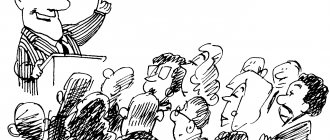History of formation
Oratory did not appear overnight. It took years to develop because it required participation and discipline. History marks its beginnings in ancient Rome, Babylon, and India. Development happened gradually. There was a need to convey updated information to the population.
This could only be done from a certain elevation, from where the person could be clearly seen. Previously, people did not think about special preparation and training. The science of rhetoric appeared relatively later.
“What offends the ears cannot penetrate the soul,” said the famous speaker.
In his works one can find many useful things for modern people: how to develop one’s talent through training and exercises, how a speaker should behave in front of an audience, what techniques can be used to decorate speech.
The era of Cicero and Quintilian was the highest flowering of rhetoric, but at the same time its final limit.
In the Middle Ages, church eloquence became the dominant genre. The Christian Church preached to everyone: both the rich nobleman and the poor peasant. Church preaching has become the most common form of oral mass communication.
The oratory art of the Middle Ages acquires a new quality. Whatever the priest spoke about, he correlated his judgments and conclusions with the Holy Scriptures. History has preserved the names of outstanding theological speakers. John Chrysostom - Byzantine preacher (died 407). The nickname itself indicates a respectful attitude towards public speech. Thomas Aquinas (1225–1274).
Kinds
Oratory can be divided into several types. They all have something in common, but differ from each other in the behavior of the lecturer, his focus on results and the characteristics of interaction:
- Socio-political speech. Involves a long speech by the speaker. His voice must be loud to cover a large amount of area. Policy issues related to social interaction are covered.
- Judicial speech. The speeches of the prosecutor, judge, and lawyer contain the necessary information. Words must be pronounced clearly, with tangible pressure. Judicial speech involves the use of a business style. There is no place for display of emotions and excessive gestures.
- Social and household. It is pronounced at an ordinary level and does not differ in scale. It happens when a person considers it necessary to prove something to his interlocutor.
- Church speech. Characterized by monotony and great concentration. From the outside, it seems that the person is overly concentrated on pronouncing every word. Examples: confession, sermon.
READ Public Speaking: Preparation, Plan, and Tips from Experienced Speakers
What is a good speaker?
A master of oratory is a person who easily masters the living word and can use it to influence an interlocutor or an entire audience. Speaking about such a professional, one cannot fail to mention the high level of speech culture. Good diction eliminates any unclear pronunciation of words and individual sounds. The speaker is pleasant and easy to listen to because there are no tongue twisters or lisps. The power of the voice is manifested not only in volume, but also in the mental impact on the consciousness and will of the listeners. In other words, the speaking technique of a real speaker is approaching perfection.
An accomplished speaker skillfully uses various techniques. For beautiful speech, the use of popular expressions, well-known proverbs and sayings is of great importance. When they are unexpected, but said to the point, the speech seems more interesting and better remembered. The speech culture of a speaker is always assessed by the richness of his vocabulary. The more words a professional has in his arsenal, the more interesting it is to communicate with him. And if, in addition to all this, the sentences are laconic and well-constructed, observing the accuracy of word usage and language norms of pronunciation, then such a speaker has no price.
Features of speech
Speech culture is an entire art. The ability to speak beautifully is not given to everyone. No matter how much you want to brag about your achievements, you will have to first learn the basics. The concept itself implies that you must have the ability to prove your point of view and know some of the secrets of acting.
We need to talk about what interests us. Then it will be possible to convey significant information to others and dwell on some points in detail. Genuine interest and passion can be seen in the eyes. The words come out of your mouth on their own, without any additional tricks.
Structure of the speech
Speaking in public is not an easy task. Some people study this for years and cannot feel relaxed during the performance. It is required not only to make detailed preparations, but also to practice gestures and learn some techniques. Without this knowledge it is impossible to achieve a satisfactory result. That is why, even at the stage of collecting information, you need to carefully study all the stages.
Introduction
An introductory part is required. It helps to establish contact and find common ground with people. It's best to start a speech with a joke. This will defuse the situation and set the audience on a positive wave. Then you can smoothly move on to the essence of the issue without thinking that someone did not understand the humor. The speaker’s task is to make an impression from the first minutes and hold the attention of the audience.
A true master does not doubt, does not look around for support, does not reach into his pocket for words. He is endearing, arouses interest, admiration, and surprise. The first words, by definition, should be pronounced quickly so that the introduction does not drag on and cause yawning. When the first stage is completed, you can move on to the next.
Main part
The main idea is presented here. If necessary, you can repeat individual theses several times. Speaking etiquette suggests that it is better to have a lively dialogue with the audience rather than trying to monotonously give information. No matter how exciting the prepared speech may be, it must be voiced correctly.
Dry words by themselves do not give anything, since they are not able to arouse interest or arouse enthusiasm. You should try to present important thoughts in portions in order to constantly warm up the attention of the audience. Stories from life are suitable, as they perfectly illustrate examples of behavior and show how one can act in a given situation.
READ Features of speech styles and their typical differences
Conclusion
Oratory speech should not be interrupted suddenly. A business conversation assumes that it is necessary to draw a conclusion from everything that is said. This will help avoid misunderstandings, situations of dissatisfaction and rejection. People must learn to benefit and see the prospects for further contact with a specific person.
The debriefing stage summarizes what has been said and gives people time to ask questions.
Features of speaker behavior
Each lecturer behaves in a unique way. This fact must be taken into account in advance so as not to be surprised by anything. Don't blindly copy someone. It is better to develop your own style and enlist personal support. You need to try to discover your own uniqueness, to believe in the existing prospects. It is necessary to decide in advance on the basic set of phrases and non-verbal means of expression.
It is better to immediately stop using some gestures. On the contrary, it is reasonable to introduce some features of communication in order to emphasize a specific idea. Kindness and honesty won't hurt. A sincere story attracts more attention than memorized phrases. If necessary, you can rehearse certain moments at home in front of the mirror. This will give you confidence.
Effective techniques
Few people think about the fact that during the process it is necessary to pay attention to certain details. The first phrase should be succinct, loud and noticeable. Ideally, it inspires the audience, carries positivity, and reveals the presence of inner strength. Reciprocal interest awakens from the fact that a person says something unusual and evokes pleasant emotions.
A pause as an effective technique is used to collect thoughts and emphasize something. Interaction with the audience should be lively, vibrant, giving inspiration and joy. If a person is too serious, then soon interest will fall in him. Interest in yourself must be constantly stirred up so that people do not get bored. If listeners leave the room or look at their phones, this is a bad sign. It's better not to let the audience get bored.
This type of rhetoric influenced the countries of Central and Western Europe.
The spread was facilitated by the absence of language barriers (sermons were read in Latin).
“Modern times” began with the Western European Renaissance, which put an end to the Middle Ages and by the beginning of the 16th century. marking a new era. It was then replaced by the Age of Enlightenment.
European writers and thinkers B. Pascal, M. Montaigne, Jean de La Bruyère, F. Bacon and others in their works left a lot of subtle advice to the speaker, precise recommendations. As in ancient rhetoric, serious attention is paid to speech technique, manners, and gestures.
For example, Leonardo da Vinci wrote:
“Good speakers, when they want to convince their listeners of something, always accompany their words with their hands, although some fools do not care about such decoration and seem like wooden chairs on their podium.”
If we turn to Russian history, then first of all we should highlight the personality of M.V. Lomonosov (1711 – 1765). It was he who undertook the difficult reform of the Russian language and laid the foundations of modern literary Russian speech. In his work “A Brief Guide to Eloquence” he wrote:
Oratory in life
The ability to speak in front of an audience will come in handy. This gives strength, confidence and healthy optimism. It becomes possible to see further prospects for actions and feel the result in advance. Public speaking improves the quality of life. A person opens up to new impressions and always finds the right words to explain his own position to his interlocutor.
Regular performances build character and help you concentrate on the main thing, without being distracted by possible trifles. The ability to communicate coherently in life is worth a lot. Most people get confused if they have to talk about something they have no idea about. Only a person trained for success attracts positive changes in life.
READ Interesting questions to help spark conversation
Development of speaking abilities
To feel confident, you need to constantly train this skill. You will have to get out of your comfort zone and put yourself in situations that would allow you to upgrade your skill to the required volume. There are several steps you need to take. It is advisable to do them sequentially. You can’t deliberately try to skip something in order to avoid unpleasant consequences:
- A clear goal. Developing public speaking abilities begins with conscious intention. Until there is an understanding of why this is necessary, targeted actions will not begin. Fantasies and fears will not help before making a decision. A specific goal will not give you a chance to put things off until later and endlessly make excuses.
- Understanding your own feelings. A person can only act clearly when he understands why he needs it and accepts responsibility for what is happening. This is necessary in order not to later regret the decision. Understanding your own feelings will give you a chance to independently master public speaking skills. It is only important to make efforts, and not just hope for a positive result.
- Constant practice. It is unlikely that you can achieve anything in life without regular training. To stop being afraid, you need to constantly train. This will give you the opportunity to gain self-confidence and decide on your next steps. It is important to remember that the ability to speak competently is not innate. Sometimes it takes years to gain self-confidence. The desire to change your life is of great importance.
- Speaking tongue twisters. A useful exercise that is advisable to use periodically. This must be done out loud, every day. If you study intermittently, then you have to start all over again. As a result, the articulatory apparatus develops, and the desire to master additional perspectives appears. If a person tries, then he succeeds quickly.
Thus, public speaking is a fascinating science. Once you master it, you can learn how to control an audience and convey the desired message. Developed communication skills help you feel at the top of your game. This means that a person becomes more self-confident and acquires the ability not to give up in the face of difficulties.









